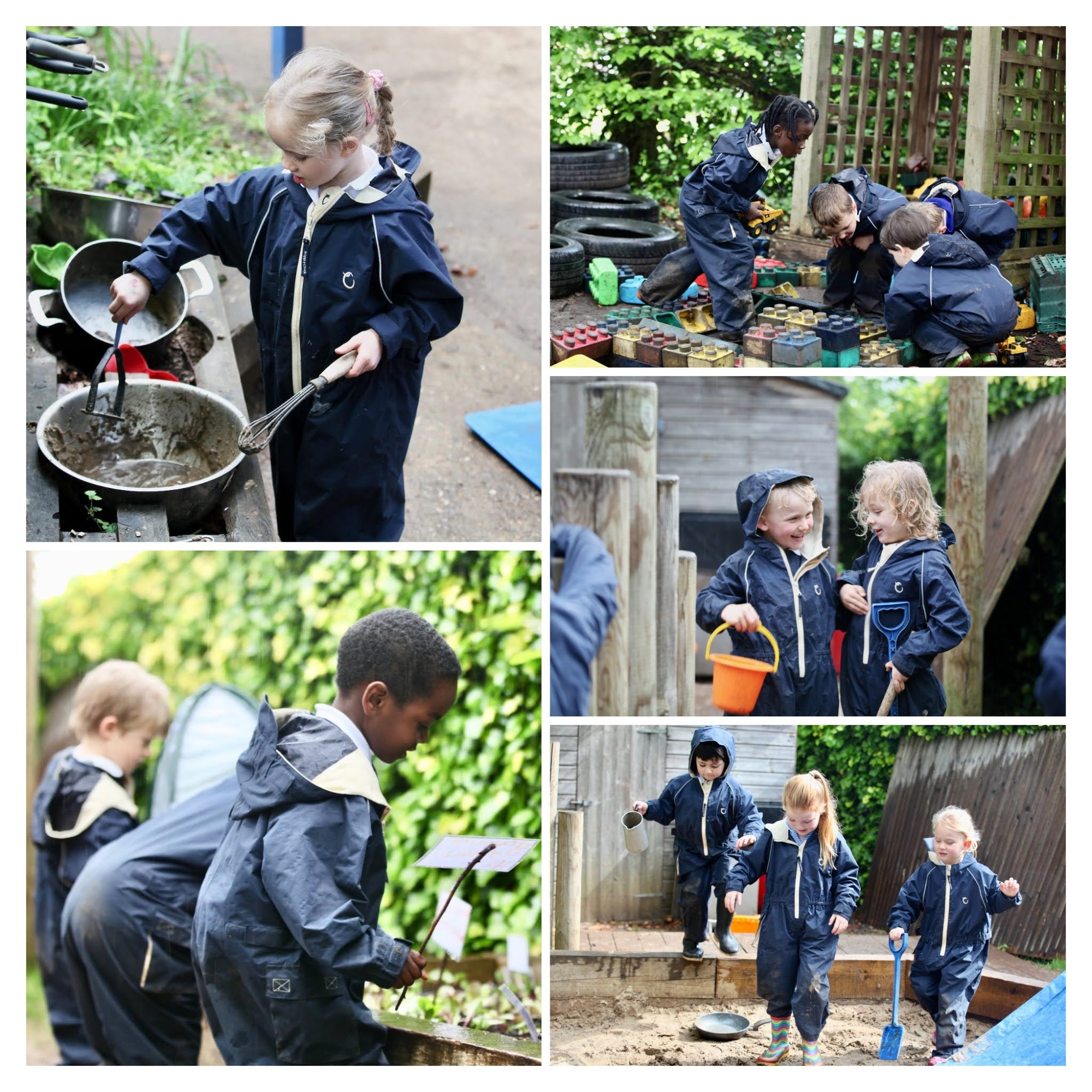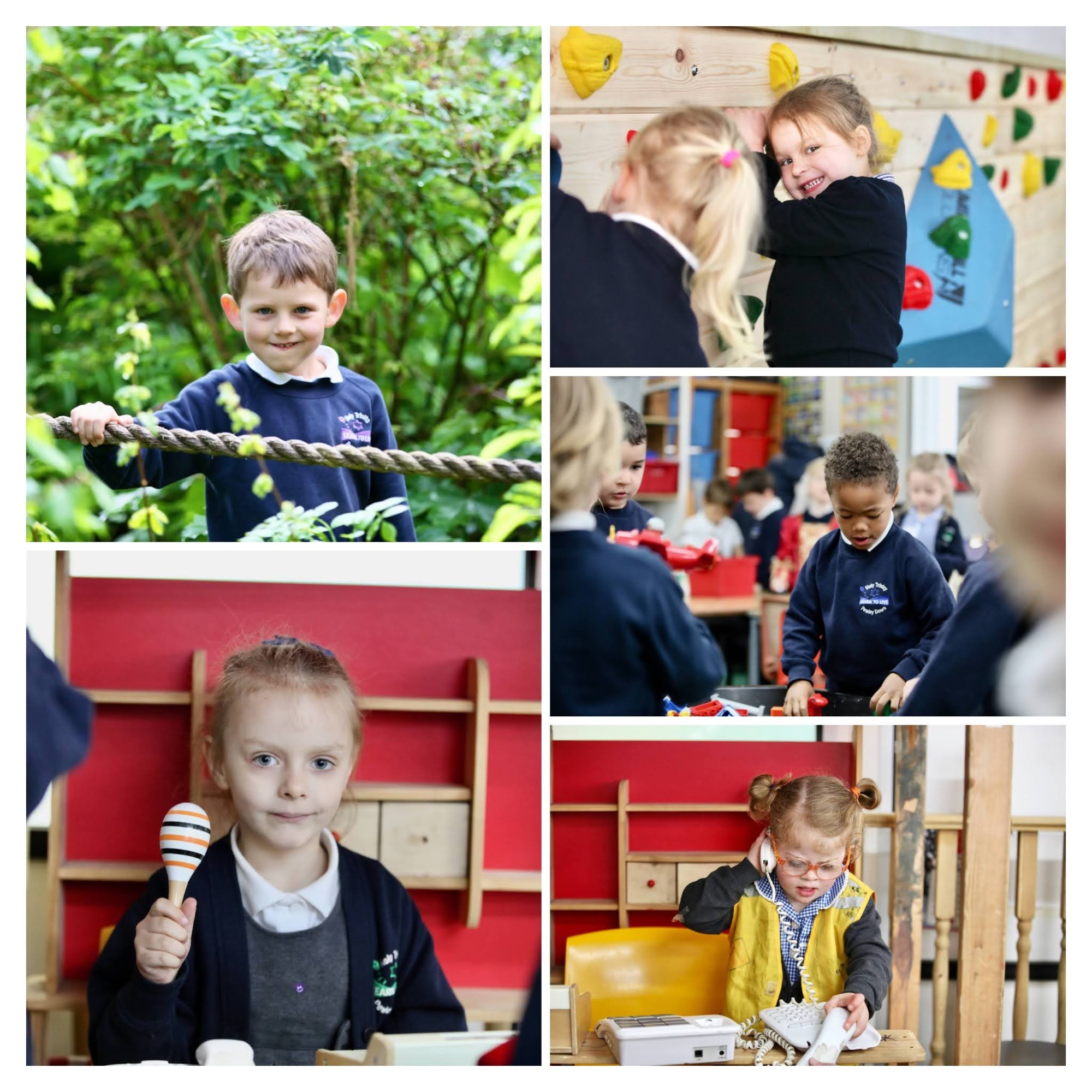Early Years Foundation Stage (EYFS)
Intent - The vision
At Holy Trinity Pewley Down (HTPD), we highly value the development of children as individuals, and know the importance of providing them with the skills, knowledge and understanding that they need to “embrace the future with hope and confidence”. Our aim in the EYFS is to build strong foundations, rooted in learning through play, so that the children go on to be active citizens of society, and happy, curious life-long learners.
Our children arrive in Reception from a variety of Nursery and Pre-School settings from across Guildford and beyond. We invest time in teaching children how to listen, speak, and meet our high expectations for behaviour by working together and being kind; it is a joy to welcome the youngest members of the HTPD community to the school, fostering their sense of belonging to something greater and beyond their own individual self.
We prioritise personal, social and emotional development, and communication and language within our carefully-planned curriculum, as well as developing children’s love of reading, writing and number. We are delighted to have an expert team of adults who can support the children as they learn through play and exploration within our enabling environment.
Our holistic EYFS curriculum maximises opportunities for meaningful cross-curricular links and learning experiences, as well as promoting the unique child by offering extended periods of play and sustained thinking, which follow children’s interests and ideas. We value imagination and creativity, and seek to create enjoyment and fascination of learning through a vibrant, continuous indoor and outdoor provision, alongside weekly sessions at the Wild Place and half-termly visits to the local library, Holy Trinity, our partner church, as well as to other locations in the town.

Implementation - How we achieve our goal
The children learn through a balance of adult-led sessions and child-initiated activities. Our Reception timetable is carefully structured so that children have directed teaching in maths and phonics every day. We also have PE and music lessons during the week, as well as Thoughtful Time and RE sessions, which usually take the form of a whole-class circle time where children feel empowered to use their voice to share what they think and believe.
When the children are not participating in these whole-class sessions, they have the opportunity to choose their own learning during ‘Discovery Time’. Our environment is carefully laid out so that children can choose where and how they would like to learn, taking responsibility to look after what they are using and managing their own risk within a safe and supported environment. We carefully resource our indoor and outdoor spaces so that children have the opportunity to free-flow between all of our areas, depending on their interests. We are fortunate to have a wonderful outdoor learning space, which includes a large sandpit, a ‘risky-play’ construction area, and a large covered outdoor classroom, the Rainbow Room. We embrace the outdoors in all weathers, ensuring that the children wear waterproof onesies and wellies during colder weather, and sunhats when it’s warm and sunny. A rainy day does not stop us going outside; it is an opportunity to jump in the puddles, use powder paint on the ground to watch the colours mix, transport water from the water butt to different places in our garden, and build a den that will keep us dry.
Adults spend focused time during the week with the children, giving children the chance to express an interest in something they would like to learn/do. For example, one child may decide that they would like to sew a cuddly toy, another might like to work together with their friends to plan a birthday party and make a big chocolate cake, whilst one may like to make a sandcastle in the sand pit. The adults help the children to engage with what they have chosen to do over a period of a few sessions or days, promoting sustained thinking and active learning, and providing enhancements to play where necessary. In this way, we ensure that the children have agency over their environment and can ensure that the provision leads to depth of learning across the curriculum. As well as using brilliant questioning, our skilled adults are quick to take on the responsibility of co-players, and use the power of play to extend children’s learning during their Discovery Time sessions.

Play is the highest level of child development. It is the spontaneous expression of thought and feeling. It constitutes the source of all that can benefit the child… At this age play is never trivial; it is serious and deeply significant
(Froebel in Lilley 1967:84)
Impact - How do we know our vision has come to fruition?
We really believe that the children’s time in Reception at HTPD is not just preparing them for Year 1, but that it is equipping them with the foundational skills and tools they will need as they continue to step out confidently into the world, making positive changes as they go. When we look at the children within HTPD, beyond EYFS, we see life-long learners. By supporting children in the ‘Characteristics of Effective Learning’ (Playing and Exploring; Active Learning; and Thinking Creatively and Critically), we believe that we are giving children the best start in life.
We know that we cannot predict all of the different kinds of challenges that children will undoubtedly face in this complex and quickly changing world, but we can already see the ways that the excellent foundation that children build in Reception at HTPD – through facing challenges, learning how to learn, and taking responsibility – empowers children to respond positively to their unfolding futures.
Lilley, I. (1967) Friedrich Froebel: A Selection from his Writings. Cambridge: Cambridge University Press.
Early Reading and Phonics
Phonics is: making connections between the sounds of our spoken words and the letters that are used to write them down.
At HTPD, we follow the Little Wandle Letters and Sounds Systematic Synthetic Phonics (SSP) scheme to teach early reading. From their starting point in Reception, the children will start to segment words into the phonemes (sounds). Starting with the letter sounds: s,a,t,p,i,n, the children learn the grapheme: phoneme correspondence and then learn to blend.
Gradually throughout their time in Reception and Year 1, children learn the whole alphabetic code. We work our way through the whole of the Little Wandle Programme until each child can read fluently.
For some children, cracking the phonetic code may take longer, like learning to ride a bike does. At HTPD, all adults in the school are trained in delivering the programme, so that we can continue to work with individuals or groups who may need additional support to be decoding fluently as they move through the school.
Alongside their daily phonics lessons in Year 1 and 2, the children take part in reading practice sessions 3 times per week, reading a phonetically decodable book, which they then bring home to continue practising reading fluently at home.
The reading practice book
It is the school’s role to teach reading. However, parents/carers play a vital role, too. It is important that children have plenty of practice reading at home in order to become fluent, confident readers.
Parents’ or carers’ support is needed to help their child practise reading and develop fluency with a book they have already read at school. This book is matched to their phonic stage and is fully decodable. If books are sent home that the child cannot decode, it will lead to frustration for the child and for the parent/carer.
To ensure that reading at home is an enjoyable experience and does not feel like a chore, schools need to send home reading practice books in which the child can read 95% of the words. It does not have to be a different book every time; it may need to be the same book if the child still needs to develop fluency.
The sharing book
If children are to become lifelong readers, it is essential that they are encouraged to read for pleasure. The desire of wanting to read will help with the skill of reading. To help foster a love of reading, children will also take a book home that they can share and enjoy with their parent/carer.
The children will choose this book from the school library and these books offer a wealth of opportunities for talking about the pictures and enjoying the story. It is important to offer a variety of books, including non-fiction, so that they can enjoy a range of different texts.
Parents/carers need to understand that they should not expect their child to read this book independently and certainly should not try to force their child to do so. The book is for the parent/carer to read to or with the child. Again, it is good to talk about the book with the child, but important not to turn the discussion into a test. The goal is enjoyment.
